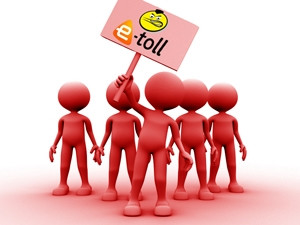
While the public awaits the outcome of consultations over the Gauteng e-toll review, which was concluded in January, opposition to the system is calling for government to denounce it.
But government is mum on the issue. Yesterday, transport minister Dipuo Peters delivered her budget vote speech in Parliament, which many expected she would use to shed light on the ongoing e-toll saga. However, Peters made no mention of the contentious system.
The minister said the Department of Transport (DOT) had set aside R12.5 billion for the SA National Roads Agency (Sanral), but this would go towards its non-toll roads, which make up 85% of SA's 21 403km road network.
The Gauteng Freeway Improvement Project - the multibillion-rand project e-tolling was introduced to fund - was not touched on.
The e-toll review panel's findings are still the subject of consultation among the powers that be, including the DOT, National Treasury, the Presidency and Sanral, with an announcement expected to be made soon.
Earlier this year, the panel recommended a hybrid funding model be adopted, which would include a contribution by motorists, as well as additional sources of revenue, such as contributions from government.
'Outright' rejection
Meanwhile, opposition party the Democratic Alliance (DA) has called for Peters to denounce the e-toll system, just as "virtually all business and civil society entities" have.
Shadow minister of transport at the DA, Manny De Freitas, pointed out to Parliament yesterday that e-toll compliance levels peaked at around 45% only in June 2014, despite Sanral's multimillion-rand marketing spend throughout 2014.
"This translates to R120 million per month, well short of their original target of R250 million per month."
De Freitas said "the absence of Sanral's ability to enforce the e-toll policy and the growing public anger" has reduced the scheme's monthly e-toll revenue collections to around R60 million by the end of February 2015. It is estimated less than 23% of users pay for the use of the freeways.
Opposition to Urban Tolling Alliance (Outa) chairman Wayne Duvenage says the alliance is alarmed by what appears to be a worsening state of public transport systems in Gauteng and the poor safety standards. He notes, since 1994, the number of vehicles on SA's roads has grown from five million to 11 million.
"One imagines that when the president's committee that reviewed state-owed entities in 2013, the pressure exerted on the commuting public must have been top of mind when the committee recommended that 'social infrastructure, including roads, should be funded more by normal taxation and less through a user pays mechanism'."
Taking this into account, Duvenage says it is not difficult to understand why the e-toll system has been "out-rightly rejected" by society.
"Sanral assured the public that alternative, safe, reliable and affordable public transport systems would be in place when e-tolling commenced, yet all evidence to date contradicts that assurance.
"Besides the risk to life and limb that public transport commuters have to endure, the endless strike action and failure by the authorities to find a durable accord with the bus drivers has resulted in the cure being worse than the disease."
Share